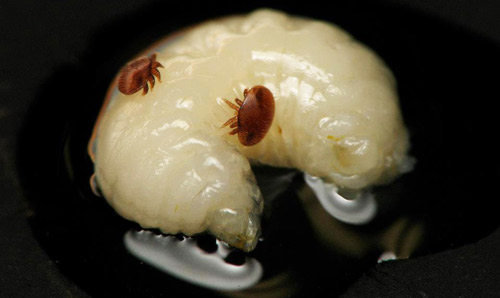
Posted on 06/27/2023 9:56:07 PM PDT by thegagline
Figures published today reveal beekeepers in the U.S. lost an estimated 48% of their honey bee colonies in 2022-23. According to an annual survey that tracks the state of managed hives, this is the second highest death rate on record after 2020-21's 51%. Honey bees are crucial to our food supply, pollinating over 100 different crop types. As reported by Bee Informed, a national collaboration of leading research labs and universities in agricultural science, the most prominent cause of colony death reported by commercial beekeepers over the year was “varroa destructor” - a parasitic mite that attacks and feeds on honey bees. In the summer, 'Queen issues' were the second most common reason cited, followed by 'adverse weather'. According to the publication, "although the total number of honey bee colonies in the country has remained relatively stable over the last 20 years (~2.6 million colonies according to the USDA NASS Honey Reports), loss rates remain high". This puts beekeepers under "substantial pressure" to create new colonies each year.

(Excerpt) Read more at statista.com ...
[U.S. Honeybees]
Well, they were supposed to be U.S. It was a three-hour tour.......
Red wing blackbirds seem to be doing ok here. I hear them a lot in migration and have seen them staking out territory in dry fields not just marshes.
They seem to display less in summer than in spring.
deer flies were big right? I remember black flies while fishing in Quebec.
I haven’t noticed. At least where I’m at all my fruit trees and everything else were covered by pollinating honey bee’s. I claim bullchit.
Small cell beekeeping as a varroa mite treatment was first proposed by Dee Lusby in Arizona. It was found later that her success was due to having Africanized bees not having anything to do with cell size.
Bee hive losses are mostly due to the asian mite "destructor".
Two female adult Varroa destructor feeding on the hemolymph of a honey bee pupa.

There's no shortage of them here in S.E. Michigan and they're all at my house. Along with the grackles and cowbirds, they've scared away the goldfinches and chickadees that would come to my bird feeders.
The chickadees, which were here all winter, disappeared in the spring upon the arrival of the red wing blackbirds.
As for the cowbirds, last year was the first year I started noticing them and their numbers this year have increased tremendously. I've been shooting them with my pellet rifle whenever I can.
“...As reported by Bee Informed, a national collaboration of leading research labs and universities in agricultural science...”
I’d consider the source, folks...
I have only seen one bee so far this month, in contrast to the norm.
ping
I haven’t see a true HoneyBee in years, since the lawn care company has used Scott’s Turf Builder to clear all clover from our lawns, which the HBs like to feed upon. The number of BumbleBees has also dropped, but there are still plenty of wasps etc around, unfortunately.
Ping
In the back yard are three twenty foot tall jasmine trees, which turn almost completely white with their frgrant blossoms once each month and can be smelled three houses away. When standing under them while they are in bloom there is a wonder hum of the bees wings and can be heard from thirty feet away.
The bee swarm has not been like it used to be about four years ago, even this morning there are few guests flying in to enjoy the pollen. Very sad.

Really? My hives are swarming fools!
They are all over here.
The primary causes of colony loss is varroa destructor, the mites get in the colony, weaken the colony, and that leaves the colony not only threatened by the mites and viruses, but also small hive beetles, foul brood, and chalk brood, and each leads to dwindling population and colony loss.
For the beekeepers out there.
Do your mite counts.
Treat the hives when needed. OA treatments are by far the best option.
Manipulate frames to always provide room for the queen to lay.
Feed the bees and know when to feed and when not to feed.
Learn how to vent your hives for the season and for your climate.
It seems to fluctuate by me. This is organic farm country, so we’re not using chemicals, so that can’t be it.
I would say I’ve seen about average for a whole range of bees and other flying things. If all the wasps were to disappear, that wouldn’t hurt my feelings at all! Beau has killed two MONSTER sized wasps for me this past week. Hate them. One season me, the dog and both cats got stung. Again, hate them! Found one in my BED last year, too! What is this? The friggin’ Amazon? It’s not called ‘The Frozen Tundra’ for nothing, LOL!
The weather has been beastly so far this season with little rain. They’re probably all hanging where they can get sufficient water and the pollen supply is better.
We have three friends that are honey producers and they’ve not said they’re having troubles this year, versus others. I’m not saying that a lack of bees ISN’T a problem as it obviously is, just from everyday observances across the land.
Disclaimer: Opinions posted on Free Republic are those of the individual posters and do not necessarily represent the opinion of Free Republic or its management. All materials posted herein are protected by copyright law and the exemption for fair use of copyrighted works.